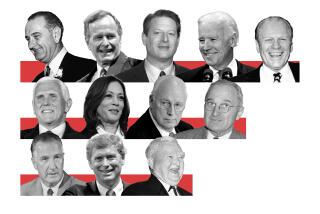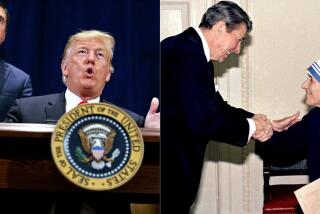A Reality Check on Al Gore
- Share via
He wowed the Democratic convention and a national television audience six weeks ago with a moving tale of the epiphany that he experienced at his sister’s deathbed on the evils of tobacco. Then, with Bob Dole continuing to flail, a recent “Doonesbury” story line spoofed the widespread insider expectation that Al Gore is already preparing his ascension to the White House in 2000.
Tonight, he will take on Jack Kemp, a leading Republican rival for the prize of the millennial presidency, in the vice presidential debate. It’s Gore’s moment. Again. But who is it, really, who occupies the moment? Arguably the most influential vice president in our history, not to mention a prominent senator and presidential candidate before that, he has received scads of media coverage, nearly all of it positive to positively glowing. Yet he remains a widely acclaimed enigma.
Intelligent, well spoken, decent in manner and conventionally handsome, well connected and blessed with an attractive family, Gore has been accepted in terms of his own positioning; namely, that of avatar of the future and exemplar of family values. Indeed, his only real negative has been a reputation for being something of a stiff, which he adroitly spoofs with various scripted bits.
Gore retired that reputation in Chicago, providing the emotional highlight of the “moments”-oriented Democratic convention. Holding the delegates and a national television audience in rapt attention, he movingly described the transformation he experienced in 1984 upon the death of his sister Nancy, a heavy smoker, from lung cancer. “Until I draw my last breath,” he declared, “I will pour my heart and soul into the cause of protecting our children from the dangers of smoking.” Which nearly brought a tear to my eye. But then, I have always loved the movies.
Unfortunately, this scenario requires a greater suspension of disbelief than most movies. The purported epiphany simply didn’t happen. Though very attentive and suitably distraught--according to my former brother-in-law, who treated the vice president’s late sister--Gore made no such resolution. Four years later, in the 1988 presidential primaries, he boasted of being a tobacco farmer and continued to derive substantial personal income and political contributions from the industry into the 1990s.
Long associated with new technologies and environmental concern, Gore is greatly aided in his futuristic positioning by his unexamined role as the administration honcho on communications and environmental policy. As senator, Gore was the cable industry’s bete noire, declaring it to be, following a spate of rate increases, “a monopoly that’s out of control.” But last spring, he went to the industry’s annual confab to praise it for “vision and good judgment.” Unfortunately, those remarks came hard upon the heels of, yes, big cable rate increases, the biggest since the ‘80s, all of them approved by a Federal Communications Commission headed by Gore confidant Reed Hundt.
This occurred before the Clinton/Gore-approved deregulation of the media business. As senator, Gore decried concentration of media ownership. But media deregulation--which, of course, sparked a bipartisan feeding frenzy of fund-raising--allows extraordinary new concentrations of media properties.
While writing his eco-globalist 1992 book, “Earth in the Balance,” Gore responded in outrage to George Bush’s delays on global warming, saying “the world can not afford to wait” to take action. Yet the world still waits, as the Clinton/Gore stance on climate change is identical to that of Bush/Quayle, despite far more impressive scientific evidence than existed then.
That his surface positioning is undergirded by serious institutional power became clear in 1994, when he engineered the selection of retired Adm. Bobby Ray Inman, a Bush backer who has held more top posts in intelligence agencies than any other American, as defense secretary. (Inman hurriedly withdrew after some press scrutiny about his personal business.) Gore, scion of a Tennessee dynasty, raised in what is now the Ritz Carlton Washington hotel, personifies the reigning union of New South and permanent Beltway.
Despite some dismay with his point man role on NAFTA and his successful alliance with disgraced consultant Dick Morris in urging Bill Clinton to sign the recent welfare bill, he is the strongest prospective Democratic frontrunner since Walter Mondale. Whether the futuristic Gore turns out to be a millennial Mondale remains to be seen. What’s clear now is that this most fortunately positioned of politicians should expect some probing questions.
More to Read
Get the L.A. Times Politics newsletter
Deeply reported insights into legislation, politics and policy from Sacramento, Washington and beyond. In your inbox twice per week.
You may occasionally receive promotional content from the Los Angeles Times.










